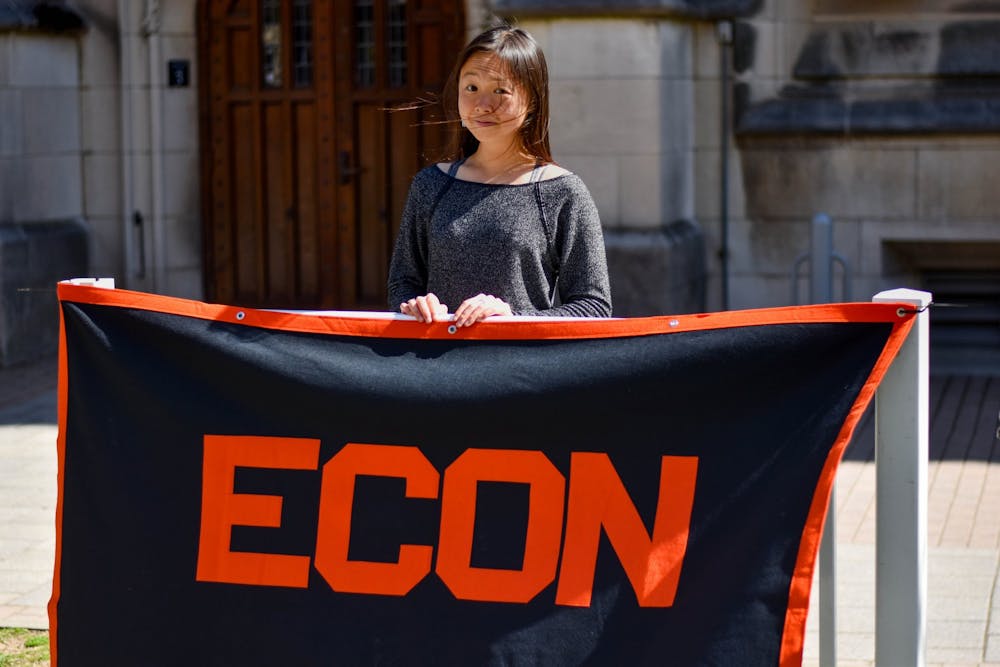In my sophomore spring, I returned from a gap semester spent taking care of my mental health. I felt refreshed and excited to restart my Princeton journey as a potential Economics major.
Since I had skirted around sophomore fall, I had not witnessed the recruiting scene that had happened for my upperclass Econ friends. At first, I didn’t even know what IB and consulting meant, since I grew up in a family of engineers. But the response I got when people asked me about my intended major was, “Oh, so you’re a snake now,” and “Selling your soul, huh?” As if selecting a major from a drop-down menu online could somehow transform me into a beast with no heart.
I was honestly hurt by those words. I didn’t want a life of chasing money. I didn’t even want to be rich. I just liked learning, and so far, I didn’t hate my Econ classes. I actually quite liked Professor Bogan’s macroeconomics class, which convinced me to declare Econ in the first place. I had only really thought of being a businesswoman after graduation. Econ just seemed the most directly connected to that.
But if Econ was going to make me into something malicious — like a so-called “snake” — or turn me into a greedy person, I wanted nothing to do with it anymore. So that same year, I switched out of Econ and declared Sociology, despite never taking a class in the department. Sure, I appreciated learning about race and class differences, and I cared about people and society. But Sociology also felt like the moral major in comparison to Econ. It seemed like the right choice.
I finished the spring semester feeling vindicated: Take that, all you haters who called me a money-seeking leech! I didn’t look into or even think about consulting or finance jobs that summer. Instead, I felt eager to pursue a major that would make me a better person. Or so I thought.
Come the fall of junior year, I found myself switching majors twice more: Sociology became Psychology, which became History of Science. Every major seemed to have a stigma attached to it: the “easy” major, the “poor teacher” route, the “dying pre-med.”
I blamed others for putting me in a hard place. Their negative comments about Econ didn’t help, and I do wish fewer people saw Econ as a sinful major. Even though I should have cared less about what others thought, it’d be nicer if other people weren’t forcing their own assumptions onto me and judging me for not knowing what I wanted yet, for choosing broad majors just because I wanted to keep my options open.
But in reality, I was the one who was selling my soul away.
I wanted the perfect major — I thought there had to be one that didn’t make me look greedy, lazy, or inadequate. In the end, it wasn’t about the major itself, but about me. I was changing majors to protect my pride, not to reflect my true interests and passions. I was acting out of fear of looking flawed, not out of love for myself.
Now fast forward another gap semester later, I’m back as an Econ major. Since then, I’ve met amazing lifelong friends in this department. I was paired with a fantastic adviser for my junior paper and got to research a topic I was truly interested about: child trafficking in China. But I’ve also been discouraged and disappointed by several poorly taught Econ classes. I’ve often wondered what it would’ve been like had I realized my deep passion for English, Creative Writing, and East Asian Studies earlier — but maybe, to quote “Hamilton,” I will “never be satisfied.”
Or maybe I can accept that for some people, it takes longer to understand what it is they’re passionate about. Maybe I can still strive to turn my “jack of all trades” into a “master of one.”
College isn’t about making the perfect choices. At the end of the day, it isn’t even about what you major in, even though that choice always seems like the biggest part of the undergraduate experience. College is a roller coaster ride called “learning from your mistakes.” If you’re making mistakes every day, that’s when you know you’re doing it right.

The thrill of growing up is that every time we try something, we learn a little more about ourselves. The value is in the experience itself, not merely the products afterward. At the end of the day, a major is just a major. But what you choose to do every day in college — the challenges you choose to face, and the mistakes and lessons that come from those choices — that’s what will shape your mind and character the most. Rather than spending your whole life regretting a decision, you can choose to accept all your mistakes and move on.
Choices give you options. They are mendable and reversible. You can choose a certain job, but you can always change that choice. The toughest challenge is simply having the courage to choose something.
How we choose affects our life. And how we react affects our character. The way I reacted to people’s criticisms my sophomore year showed me I had, and still have, a lot of room to grow.
Lillian Chen is a senior at Princeton University. She is not defined by her concentration and can be reached at lillianc@princeton.edu.








